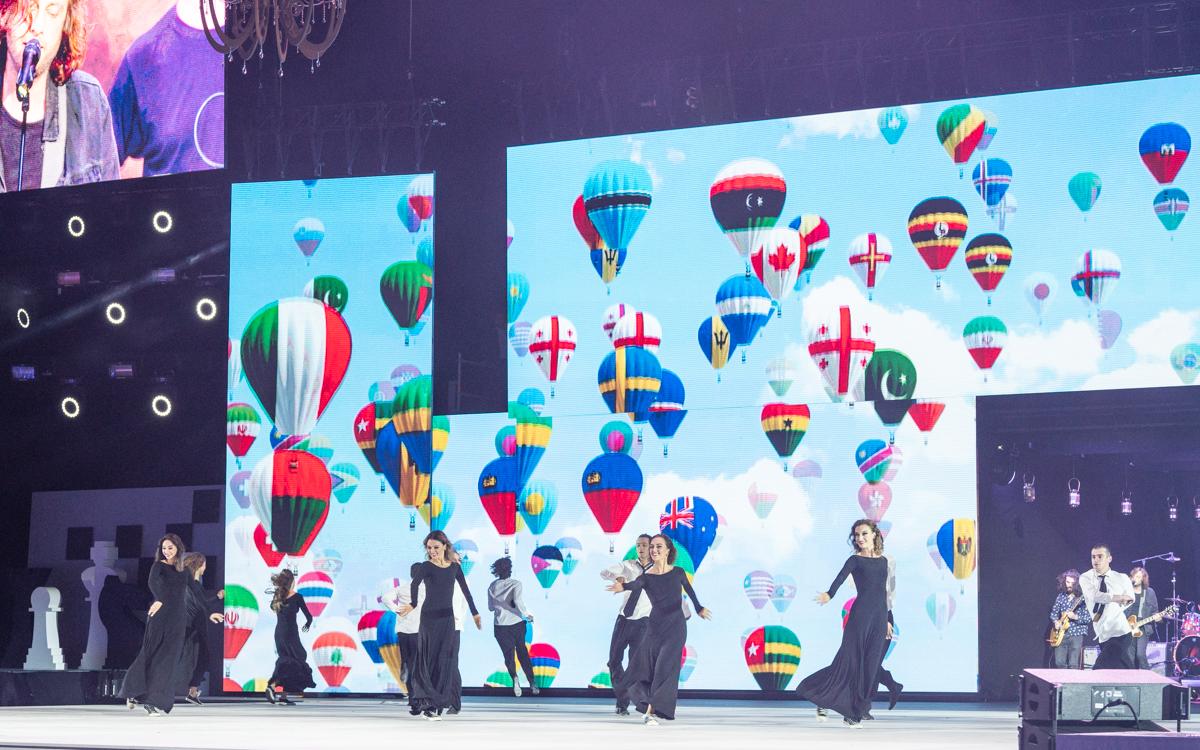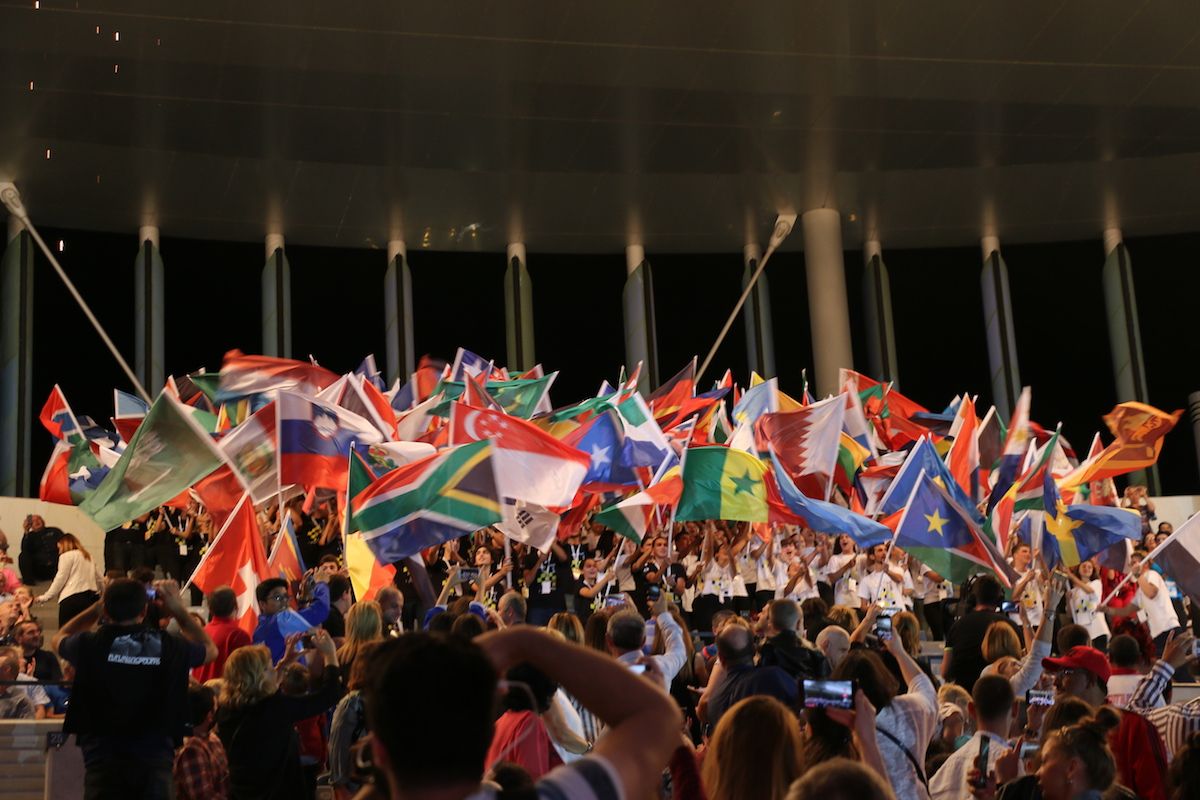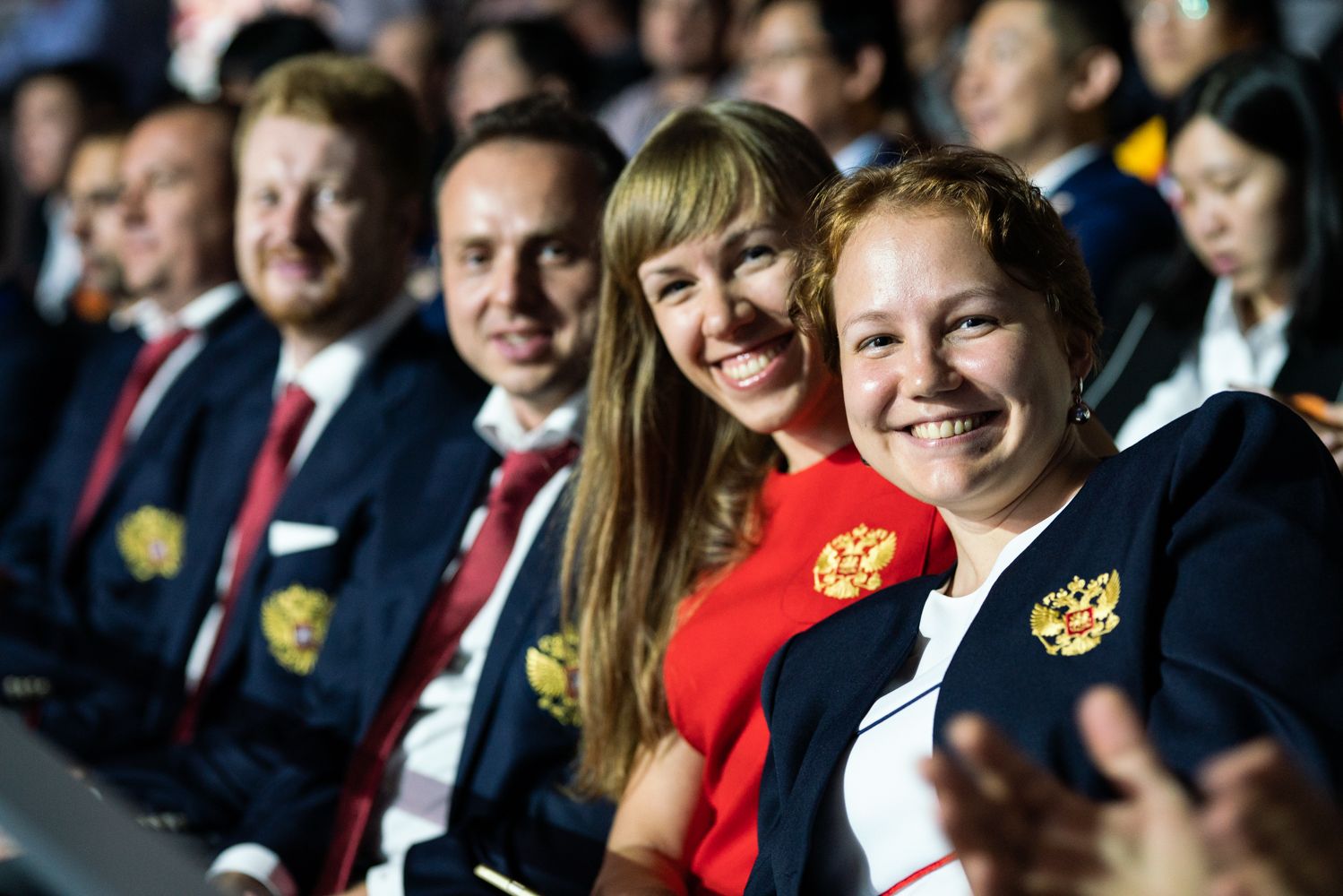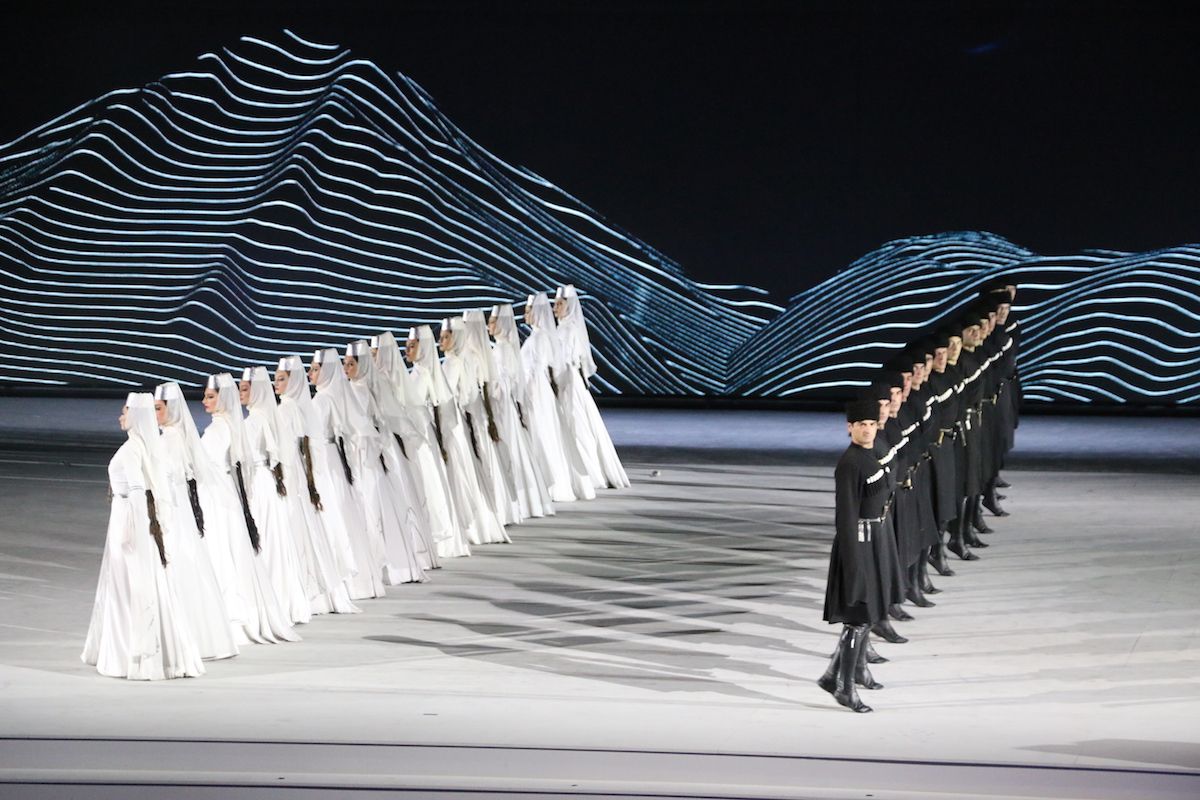
Chess Olympiad Starts With Spectacular Ceremony
The 43rd Chess Olympiad in Batumi, Georgia officially opened on Sunday with a spectacular opening ceremony that included dancing and singing performances, speeches and the drawing of colors. Many esteemed members of the chess community called it the best ever, including players like Ivan Cheparinov, who is about to play in his eighth Olympiad.
The rich chess history of Georgia could be felt throughout the opening ceremony, held 45 km away from the Batumi city center in the 10,000-seat Black Sea Arena, which in the past hosted stars such as Elton John, Ennio Morricone and Katie Melua.

Most seats were filled in the Black Sea Arena. | Photo: Maria Emelianova/Chess.com.
Especially in women's chess, the country has excelled in the past. Nona Gaprindashvili, Maia Chiburdanidze (who together held the chess crown in Georgia for 29 years) and Nana Alexandria (twice a vice-world champion) were mentioned several times, always with a warm applause from the audience.
The organizers didn't hold back, and presented a ceremony with colorful dancing and singing performances with both modern elements and references to the past. The show included traditional Georgian songs and dances as well as a DJ performance, a rock band and performances by the State Symphony Orchestra and Georgian National Ballet.
A Chess.com video report, including interviews.
Speeches were delivered by the Minister of Education, Science, Culture and Sports of Georgia Mikheil Batiashvili, the Chairman of the Government of the Autonomous Republic of Adjara Tornike Rizhvadze, the President of Georgia Giorgi Margvelashvili and FIDE Acting President Georgios Makropoulos.

Georgios Makropoulos spoke as FIDE's acting president at the first opening ceremony without Kirsan Ilyumzhinov in an official role since Yerevan 1996. | Photo: Maria Emelianova/Chess.com.
Makropoulos, who is one of the three candidates for the FIDE presidency, gave a speech that breathed elections. He seemed to be claiming his October 3 victory already, like a young chess player who puts out his hand and says: "I offer you... to resign."
"FIDE, national chess federations, players, we must all demand the best for our sport, for our game, and for the image of FIDE worldwide. We have great weapons in this fight: famous chess champions, new technologies, chess in schools and of course the national chess federations, who work very hard and with great dignity to develop chess in their countries. We must use these talents, we must make the right moves and I promise you we have a winning position to accomplish our dreams for a new era for FIDE, for a FIDE that will achieve the Olympic destiny of chess, for a FIDE where everybody will be proud to be a member, proud to represent chess in their countries, proud to have a strong, active, independent vote."
Did everything except tell the federations to vote for him
— shaunpress (@shaunpress) September 23, 2018
The presentation of the participating countries is always an impressive part of Olympiad openings, for the simple reason that it takes several minutes to show, in this case, more than 180 flags! We'll have to wait and see how many of these federations will show up (each Olympiad sees a high number of countries who cannot make the trip) before we can speak of records.

Can you find your home country's flag? Chances are it is somewhere in this shot. | Photo: Mike Klein/Chess.com.
Another key part was the drawing of colors. Because Fabiano Caruana's flight was delayed (he landed in Batumi during the ceremony), Viswanathan Anand took the honors instead, along with board one of the Georgian women's team, Nana Dzagnidze.
Anand picked a white pearl from a giant seashell, which meant that USA, as the top seeded team in the open section, will start with white on boards one and three. Dzagnidze picked a black pearl which determined the color of board one in the women section. Consequently, the Russian women will have black on the odd boards.

One previous world champion substitutes for its next challenger: Viswanathan Anand took over for Fabiano Caruana and selected the white pearl, which he got to keep! | Photo: Maria Emelianova/Chess.com.
The ceremony, which featured both giant sparklers inside the arena and a scripted rainfall event on the stage, finished in the sky. Players turned around to look through the windows to see a huge fireworks presentation outside the Black Sea Arena which lasted for several minutes.
The ceremony, which was broadcast live on Georgian television, can be watched here.
Here's some facts and figures to get you ready for the 11-round tournament:
- USA is the top seed in the open section, the first time since 1976 that neither Russian nor the Soviet Union has the pole position (they didn't play that year).
- Despite last month's preview article, the American squad will not go in with a record-setting rating. Hikaru Nakamura and Wesley So both lost points at the Sinquefield Cup, so the average rating goes from 2777 to 2772, which appears to be one point lower than Russia 2014, which was 2773.
- Nine of the world's top 10 are competing (only Magnus Carlsen will miss) and 17 of the world's top 20 (Alexander Grischuk and Peter Svidler were both left off the Russian team by captain's decision).
- Five teams in the open have an average rating over 2700 (USA, Russia, China, Azerbaijan and India). However, Ukraine is at 2698 and only lost team gold in 2016 by a narrow tiebreak.
- Strangely there are three teams exactly tied for seventh: France, Armenia and England.
- One team in the women's section has an average rating over 2500: Russia. They bring back all five players from 2016 where they finished fourth, just outside the medals.

Olga Girya and Valentina Gunina of the Russian women's team. | Photo: Maria Emelianova/Chess.com.
- The Chinese women, returning gold medalists, have chosen a different track and only return one player from 2016. Ju Wenjun is the only woman returning (world number one Hou Yifan is at university in England).
- A total of 185 team are registered for the open section, and nearly that many individual federations (the host nation is allowed to send multiple teams and there are also teams representing not federations but instead groups of disabled athletes. The open teams range from USA at 2772 to Central African Republic, the only team with all unrated players.
- In the women's, 151 teams are registered from more than 145 federations. They are led by Russia (2523) all the way down to eight different teams that are all unrated (there are no countries bringing only a women's team by the way).
- A total of 1667 players are registered, 920 in the open and 747 in the women's tournament.
- Women are allowed to play in the open section (that's why it bears that name!). Just to name a few that are doing so this year, despite their federations also having women's team present: WGM Qianyun Gong, board three for Singapore, and WCM Polina Karelina, board one for the Bahamas.
- If there symbiosis in other sports, only three of the top 10 teams in the open also had their nation make the football world cup finals, but Russia, France, and England all advanced to the knockout round (France won of course).

"Gens Una Sumus" -- We are all one...orchestra! | Photo: Mike Klein/Chess.com.
Full first-round pairings can be found here. The opener is often a chance for smaller nations to get valuable experience against grandmasters, and for some to pull off the occasional upset. USA draws Panama, one of the nations that edged them out for the football world cup finals. Russia takes on Uganda; China gets Morocco; India against El Salvador; and Ukraine against Zambia. Azerbaijan, the fourth seed, will not play alongside the other favorites, at least for a round. They will play on a fixed board (34) since they face the International Physically Disabled Chess Association (IPCA) team.
In the women's event, Russia plays the Ticas of Costa Rica on top board. Other top pairings are: Ukraine-Monaco; China-Tajikistan; Georgia 1-South Korea; and India-New Zealand.
Here's some pictorial highlights from the colorful night:

Plenty of lighting and costume changes pervaded the elaborate ceremony. | Photo: Maria Emelianova/Chess.com.

Most of the dance sequences were ensemble, including this one. | Photo: Maria Emelianova/Chess.com.

Starting in round one, the chess pieces will be facing each other. | Photo: Mike Klein/Chess.com.

The orchestra would constantly "reappear" as the stage backdrop opened up to reveal them. | Photo: Mike Klein/Chess.com.

Yes, the noise eclipsed 100 decibels for most of the night (but not the "Boom Boom Boom" being complained of on Batumi's beaches!) | Photo: Mike Klein/Chess.com.

GM Nana Dzagnidze selected the black pearl for the women's pairings. | Photo: Maria Emelianova/Chess.com.

Shakhriyar Mamedyarov (middle, blue shirt), the second highest-rated player in Batumi who became a father only a few days ago, will lead the Azerbaijan team. | Photo: Maria Emelianova/Chess.com.

Team Ghana was colorful enough to be on stage for the opening ceremony, but instead here they are just after. | Photo: Mike Klein/Chess.com.
Mike Klein contributed to this report.


